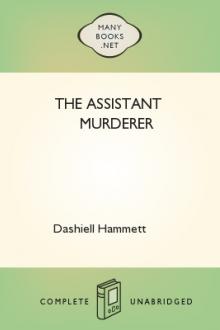The Assistant Murderer by Dashiell Hammett (best books for 7th graders .TXT) 📖

- Author: Dashiell Hammett
- Performer: -
Book online «The Assistant Murderer by Dashiell Hammett (best books for 7th graders .TXT) 📖». Author Dashiell Hammett
Alec Rush grunted and croaked another dubious inquiry.
“How come you trust me so much, Scuttle?”
The hired killer laughed knowingly.
“Why not? You’re a right guy. You can see a profit when it’s showed to you. They didn’t chuck you off the force for forgetting to hang up your stocking. Besides, suppose you want to double-cross me, what can you do? You can’t prove anything. I told you I didn’t mean the woman any harm. I ain’t even packing a gun. But all that’s the bunk. You’re a wise head. You know what’s what. Me and you, Alec, we can get plenty!”
Silence again, until the detectives spoke slowly, thoughtfully.
“The first thing would be to get a line on the reasons your parties want the girl put out. Got anything on that?”
“Not a whisper.”
“Both of ‘em women, I take it.”
Scuttle Zeipp hesitated.
“Yes,” he admitted. “But don’t be asking me anything about ‘em. In the first place, I don’t know anything, and in the second, I wouldn’t tip their mitts if I did.”
“Yeah,” the detective croaked, as if he quite understood his companion’s perverted idea of loyalty. “Now if they’re women, the chances are the racket hangs on a man. What do you think of Landow? He’s a pretty lad.”
Scuttle Zeipp leaned over to put his finger against the detective’s chest again.
“You’ve got it, Alec! That could be it, damned if it couldn’t!”
“Yeah,” Alec Rush agreed, fumbling with the levers of his car. “We’ll get away from here and stay away until I look into him.”
At Franklin Street, half a block from the rooming-house into which he had shadowed the young man that afternoon, the detective stopped his coupe.
“You want to drop out here?” he asked.
Scuttle Zeipp looked sidewise, speculatively, into the elder man’s ugly face.
“It’ll do,” the young man said, “but you’re a damned good guesser, just the same.” He stopped with a hand on the door. “It’s a go, is it, Alec? Fifty-fifty?”
“I wouldn’t say so.” Alec Rush grinned at him with hideous good nature. “You’re not a bad lad, Scuttle, and if there’s any gravy you’ll get yours, but don’t count on me mobbing up with you.”
Zeipp’s eyes jerked to slits, his lips snarled back from yellow teeth that were set edge to edge.
“You sell me out, you damned gorilla, and I’ll — ” He laughed the threat out of being, his dark face young and careless again. “Have it your own way, Alec. I didn’t make no mistake when I throwed in with you. What you say goes.”
“Yeah,” the ugly man agreed. “Lay off that joint out there until I tell you. Maybe you’d better drop in to see me tomorrow. The phone book’ll tell you where my office is. So long, kid.”
“So long, Alec.”
In the morning Alec Rush set about investigating Hubert Landow. First he went to the City Hall, where he examined the gray books in which marriage licenses are indexed. Hubert Britman Landow and Sara Falsoner had been married six months before, he learned.
The bride’s maiden name thickened the red in the detective’s bloodshot eyes. Air hissed sharply from his flattened nostrils. “Yeah! Yeah!” he said to himself, so raspingly that a lawyer’s skinny clerk, fiddling with other records at his elbow, looked frightenedly at him and edged a little away.
From the City Hall, Alec Rush carried the bride’s name to two newspaper offices, where, after studying the files, he bought an armful of six-month-old papers. He took the papers to his office, spread them on his desk, and attacked them with a pair of shears. When the last one had been cut and thrown aside, there remained on his desk a thick sheaf of clippings.
Arranging his clippings in chronological order, Alec Rush lighted a black cigar, put his elbows on the desk, his ugly head between his palms, and began to read a story with which newspaper-reading Baltimore had been familiar half a year before.
Purged of irrelevancies and earlier digressions, the story was essentially this:
Jerome Falsoner, aged forty-five, was a bachelor who lived alone in a flat in Cathedral Street, on an income more than sufficient for his comfort. He was a tall man, but of delicate physique, the result, it may have been, of excessive indulgence in pleasure on a constitution none too strong in the beginning. He was well-known, at least by sight, to all night-living Baltimoreans, and to those who frequented race-track, gambling-house, and the furtive cockpits that now and then materialise for a few brief hours in the forty miles of country that lie between Baltimore and Washington.
One Fanny Kidd, coming as was her custom at ten o’clock one morning to “do” Jerome Falsoner’s rooms, found him lying on his back in his living-room, staring with dead eyes at a spot on the ceiling, a bright spot that was reflected sunlight — reflected from the metal hilt of his paper-knife, which protruded from his chest.
Police investigation established four facts:
First, Jerome Falsoner had been dead for fourteen hours when Fanny Kidd found him, which placed his murder at about eight o’clock the previous evening.
Second, the last persons known to have seen him alive were a woman named Madeline Boudin, with whom he had been intimate, and three of her friends. They had seen him, alive, at some time between seven-thirty and eight o’clock, or less than half an hour before his death. They had been driving down to a cottage on the Severn River, and Madeline Boudin had told the others she wanted to see Falsoner before she went. The others had remained in their car while she rang the bell. Jerome Falsoner opened the street door and she went in. Ten minutes later she came out and rejoined her friends. Jerome Falsoner came to the door with her, waving a hand at one of the men in the car — a Frederick Stoner, who knew Falsoner slightly, and who was connected with the district attorney’s office. Two women, talking on the steps of a house across the street, had also seen Falsoner, and had seen Madeline Boudin and her friends drive away.
Third, Jerome Falsoner’s heir and only near relative was his niece, Sara Falsoner, who, by some vagary of chance, was marrying Hubert Landow at the very hour that Fanny Kidd was finding her employer’s dead body. Niece and uncle had seldom seen one another. The niece — for police suspicion settled on her for a short space — was definitely proved to have been at home, in her apartment in Carey Street, from six o’clock the evening of the murder until eight-thirty the next morning. Her husband, her fianc�� then, had been there with her from six until eleven that evening. Prior to her marriage, the girl had been employed as stenographer by the same trust company that employed Ralph Millar.
Fourth, Jerome Falsoner, who had not the most even of dispositions, had quarrelled with an Icelander named Einar Jokumsson in a gambling-house two days before he was murdered. Jokumsson had threatened him. Jokumsson — a short, heavily built man, dark-haired, dark-eyed — had vanished from his hotel, leaving his bags there, the day the body was found, and had not been seen since.
The last of these clippings carefully read, Alec Rush rocked back in his chair and made a thoughtful monster’s face at the ceiling. Presently he leaned forward again to look into the telephone directory, and to call the number of Ralph Millar’s trust company. But when he got his number he changed his mind.
“Never mind,” he said into the instrument, and called a number that was Goodbody’s. Minnie, when she came to the telephone, told him that Polly Vanness had been identified as one Polly Bangs, arrested in Milwaukee two years ago for shoplifting, and given a two-year sentence. Minnie also said that Polly Bangs had been released on bail early that morning.
Alec Rush pushed back the telephone and looked through his clippings again until he found the address of Madeline Boudin, the woman who had visited Falsoner so soon before his death. It was a Madison Avenue number. Thither his coupe carried the detective.
No, Miss Boudin did not live there. Yes, she had lived there, but had moved four months ago. Perhaps Mrs. Blender, on the third floor, would know where she lived now. Mrs. Blender did not know. She knew Miss Boudin had moved to an apartment house in Garrison Avenue, but did not think she was living there now. At the Garrison Avenue house: Miss Boudin had moved away a month and a half ago — somewhere in Mount Royal Avenue, perhaps. The number was not known.
The coupe carried its ugly owner to Mount Royal Avenue, to the apartment building he had seen first Hubert Landow and then Scuttle Zeipp visit the previous day. At the manager’s office he made inquiries about a Walter Boyden, who was thought to live there. Walter Boyden was not known to the manager. There was a Miss Boudin in 604, but her name was B-o-u-d-i-n, and she lived alone.
Alec Rush left the building and got in his car again. He screwed up his savage red eyes, nodded his head in a satisfied way, and with one finger described a small circle in the air. Then he returned to his office.
Calling the trust company’s number again, he gave Ralph Millar’s name, and presently was speaking to the assistant cashier.
“This is Rush. Can you come up to the office right away?”
“What’s that? Certainly. But how — how — ? Yes, I’ll be up in a minute.”
None of the surprise that had been in Millar’s telephone voice was apparent when he reached the detective’s office. He asked no questions concerning the detective’s knowledge of his identity. In brown today, he was as neatly inconspicuous as he had been yesterday in gray.
“Come in,” the ugly man welcomed him. “Sit down. I’ve got to have some more facts, Mr. Millar.”
Millar’s thin mouth tightened and his brows drew together with obstinate reticence.
“I thought we settled that point, Rush. I told you — “
Alec Rush frowned at his client with jovial, though frightful exasperation.
“I know what you told me,” he interrupted. “But that was then and this is now. The thing’s coming unwound on me, and I can see just enough to get myself tangled up if I don’t watch Harvey. I found your mysterious man, talked to him. He was following Mrs. Landow, right enough. According to the way he tells it, he’s been hired to kill her.”
Millar leaped from his chair to lean over the yellow desk, his face close to the detective’s.
“My God, Rush, what are you saying? To kill her?”
“Now, now! Take it easy. He’s not going to kill her. I don’t think he ever meant to. But he claims he was hired to do it.”
“You’ve arrested him? You’ve found the man who hired him?”
The detective squinted up his bloodshot eyes and studied the younger man’s passionate face.
“As a matter of fact,” he croaked calmly when he had finished his examination, “I haven’t done either of those things. She’s in no danger just now. Maybe the lad was stringing me, maybe he wasn’t, but either way he wouldn’t have spilled it to me if he meant to do anything. And





Comments (0)